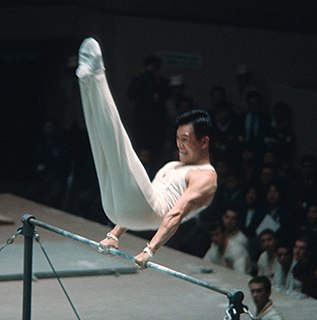
The men's horizontal bar was a gymnastics event contested as part of the Gymnastics at the 1964 Summer Olympics programme at the Tokyo Metropolitan Gymnasium. The event was held on 18, 20, and 23 October. There were 128 competitors from 29 nations, with nations in the team competition having up to 6 gymnasts and other nations entering up to 3 gymnasts. The event was won by Boris Shakhlin of the Soviet Union, the nation's first victory in the horizontal bar after two Games with silver and bronze medals. The Soviets also took silver, with Yuri Titov finishing second. Shakhlin and Titov were the fifth and sixth men to win multiple medals in the horizontal bar. Bronze went to Miroslav Cerar of Yugoslavia.

The men's artistic individual all-around was an artistic gymnastics event held as part of the Gymnastics at the 1912 Summer Olympics programme. The competition was held on 12 July at the Stockholm Olympic Stadium. It was the fourth appearance of the event. There were 44 competitors from 9 nations. Each nation was limited to 6 gymnasts. The event was won by Alberto Braglia of Italy, the first man to successfully defend a title in the artistic individual all-around. The bronze medalist from 1908, Louis Ségura, this time took silver. Braglia and Ségura were the first two men to win multiple medals in the event. Italian Adolfo Tunesi earned bronze.

The men's parallel bars competition was one of eight events for male competitors of the artistic gymnastics discipline contested in the gymnastics at the 2004 Summer Olympics in Athens. The qualification and final rounds took place on August 14 and August 23 at the Olympic Indoor Hall. There were 81 competitors from 31 nations, with nations competing in the team event having up to 5 gymnasts and other nations having up to 2 gymnasts. The event was won by Valeriy Honcharov of Ukraine, the nation's second victory in the parallel bars. Hiroyuki Tomita took silver, putting Japan above the Soviet Union on the all-time medal table for the event. Li Xiaopeng of China became the seventh man to win multiple parallel bars medals with his bronze adding to his 2000 gold.

The men's parallel bars competition at the 2008 Summer Olympics was held on August 9 and 19 at the Beijing National Indoor Stadium. The eight competitors with the highest scores in qualifying proceeded to the men's parallel bars finals. There, each gymnast performed again; the scores from the final round determined the final ranking. There were 75 competitors from 27 nations that competed on the parallel bars, with nations in the team event entering up to 5 gymnasts while other nations could enter up to 2. The event was won by Li Xiaopeng of China, the first man to win three medals in the parallel bars as well as the first man to win two non-consecutive gold medals in the same apparatus. Yoo Won-Chul of South Korea took silver. Anton Fokin won Uzbekistan's first parallel bars medal in its debut as an independent nation.
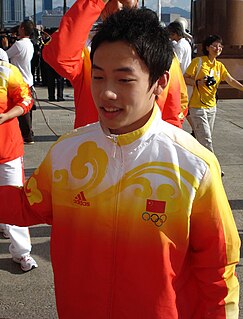
The men's horizontal bar competition at the 2008 Summer Olympics was held on 9 and 19 August at the Beijing National Indoor Stadium. The eight competitors with the highest scores in qualifying proceeded to the men's horizontal bar finals. There, each gymnast performed again; the scores from the final round determined final ranking. There were 76 competitors from 27 nations that competed on the horizontal bar, with nations in the team event entering up to 5 gymnasts while other nations could enter up to 2. The event was won by Zou Kai of China, the nation's first victory in the horizontal bar. Jonathan Horton won silver, the United States' second consecutive Games with a silver medalist in the horizontal bar. Germany's Fabian Hambüchen won the first of his three medals in the event with bronze.

The men's artistic individual all-around event was part of the gymnastics programme at the 1924 Summer Olympics. It was one of nine gymnastics events and it was contested for the sixth time. The competition was held from Thursday, 17 July 1924, to Wednesday, 23 July 1924. Seventy-two gymnasts from nine nations competed. Each nation could send up to 8 gymnasts, up from 6 in previous Games. For the first time since 1904, the scores for individual competitors were used to calculate a team score. The men's artistic individual all-around was won by Leon Štukelj of Yugoslavia. Czechoslovakia's Robert Pražák took silver, while Bedřich Šupčík earned bronze. Both nations were making their debut in the event.
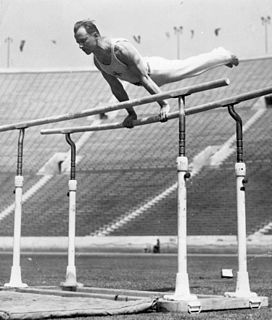
The men's parallel bars event was part of the gymnastics programme at the 1932 Summer Olympics. It was contested for the fifth time after 1896, 1904, 1924, and 1928. The competition was held on Friday, August 12, 1932. Fifteen gymnasts from six nations competed. Each nation was limited to three gymnasts. The event was won by Romeo Neri of Italy, the nation's first victory in the men's parallel bars. István Pelle earned Hungary's first medal in the event with his silver, while Heikki Savolainen similarly earned Finland's first medal with his bronze.
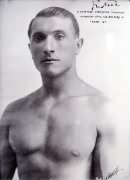
The men's artistic individual all-around event was part of the gymnastics programme at the 1932 Summer Olympics. It was the eighth appearance of the event, which was established in 1900. The competition was held from Monday, August 8, 1932, to Wednesday, August 10, 1932. Twenty-four gymnasts from five nations competed. Each nation could enter a team of 5 gymnasts; Hungary sent only 4. The event was won by Romeo Neri of Italy, the nation's first victory in the event since 1920 and fourth overall. István Pelle of Hungary took silver and Heikki Savolainen of Finland earned bronze; it was the first medal in the event for each nation.

The men's horizontal bar competition was one of eight events for male competitors in artistic gymnastics at the 1976 Summer Olympics in Montreal. The qualification and final rounds took place on July 18, 20, and 23rd at the Montreal Forum. There were 90 competitors from 20 nations, with nations competing in the team event having 6 gymnasts while other nations could have up to 3 gymnasts. The event was won by Mitsuo Tsukahara of Japan, the second man to successfully defend an Olympic title in the horizontal bar. It was the third consecutive victory by a Japanese gymnast in the event, and fifth in six Games. Japan also took silver, as Eizo Kenmotsu finished second, but was prevented from repeating its 1972 podium sweep by new rules that limited nations to two gymnasts in the final. Tsukuhara and Kenmotsu were the seventh and eighth men to win multiple medals in the horizontal bar. Henri Boerio of France and Eberhard Gienger of West Germany tied for bronze, the first medal for France in the event since 1924 and first horizontal bar medal for West Germany.

The men's horizontal bar competition was one of eight events for male competitors in artistic gymnastics at the 1980 Summer Olympics in Moscow. The qualification and final rounds took place on July 20, 22 and 25th at the Luzhniki Palace of Sports. There were 65 competitors from 14 nations, with nations competing in the team event having 6 gymnasts while other nations could have to up to 3 gymnasts. The event was won by Stoyan Deltchev of Bulgaria, the nation's first medal in the horizontal bar. The Soviet Union took silver and bronze, reaching the podium in 1968 for the first time since 1968. Japan's three-Games gold medal streak ended, with no Japanese gymnasts competing due to the American-led boycott.

The men's horizontal bar competition was one of eight events for male competitors in artistic gymnastics at the 1968 Summer Olympics in Mexico City. The event was held on 22, 24, and 26 October. There were 115 competitors from 27 nations, with nations in the team competition having up to 6 gymnasts and other nations entering up to 3 gymnasts. The event was won in a tie between Akinori Nakayama of Japan and Mikhail Voronin of the Soviet Union. Eizo Kenmotsu of Japan took bronze.

The men's horizontal bar competition was one of eight events for male competitors in artistic gymnastics at the 1960 Summer Olympics in Rome. It was held on 5, 7, and 10 September at the Baths of Caracalla. There were 130 competitors from 28 nations, with nations in the team competition having up to 6 gymnasts and other nations entering up to 2 gymnasts. The event was won by Takashi Ono of Japan, the nation's second consecutive victory in the men's parallel bars. Masao Takemoto gave Japan a second medal with his silver. Ono and Takemoto were the third and fourth men to win multiple medals in the parallel bars; Ono was the first to win two gold medals in the event. Boris Shakhlin of the Soviet Union took bronze.

The men's horizontal bar competition at the 2012 Summer Olympics in London, United Kingdom was held at the North Greenwich Arena 1]] on 28 July and 7 August. There were 70 competitors from 33 nations. The event was won by Epke Zonderland of the Netherlands, the nation's first victory in the horizontal bar. Fabian Hambüchen of Germany took silver, while Zou Kai of China earned bronze. Hambüchen and Zou, bronze and gold medalists respectively in 2008, were the 11th and 12th men to win multiple medals in the event.

The men's horizontal bar event was part of the gymnastics programme at the 1928 Summer Olympics. It was one of seven gymnastics events for men and it was contested for the fourth time after 1896, 1904, and 1924. Scores from the horizontal bar event were added to the results from other individual apparatus events to give aggregate scores for the individual and team all-around events. There were 86 gymnasts from 11 nations, with each nation having a team of up to 8 gymnasts. The event was won by Georges Miez of Switzerland, the nation's first victory in the men's horizontal bar. The silver medal went to Romeo Neri of Italy, with Eugen Mack of Switzerland earning bronze.

The men's horizontal bar competition at the 2016 Summer Olympics was held at the HSBC Arena on 6 and 16 August. There were 71 competitors from 34 nations. The event was won by Fabian Hambüchen of Germany, the nation's first victory in the horizontal bar since 1996 and third overall. Danell Leyva won the United States' third silver medal in four Games in the event; Nile Wilson's bronze was Great Britain's first-ever medal in the horizontal bar.

The men's horizontal bar competition at the 1948 Summer Olympics was held at Earls Court Exhibition Centre on 12 and 13 August. It was the seventh appearance of the event. There were 121 competitors from 16 nations, with each nation sending a team of up to 8 gymnasts. The event was won by Josef Stalder of Switzerland, with his countryman Walter Lehmann taking silver. It was the nation's second victory in the event, tying the United States for most all-time. Veikko Huhtanen of Finland earned bronze, giving Finland a three-Games podium streak in the event.

The vault is an artistic gymnastics event held at the Summer Olympics. The event was first held for men at the first modern Olympics in 1896. It was held again in 1904, but not in 1900, 1908, 1912, or 1920 when no apparatus events were awarded medals. The vault was one of the components of the men's artistic individual all-around in 1900, however. The men's vault returned as a medal event in 1924 and has been held every Games since. Vault scores were included in the individual all-around for 1924 and 1928, with no separate apparatus final. In 1932, the vault was entirely separate from the all-around. From 1936 to 1956, there were again no separate apparatus finals with the vault scores used in the all-around. The women's vault was added in 1952 and has been held every Games since. Beginning in 1960, there were separate apparatus finals.

The pommel horse is an artistic gymnastics event held at the Summer Olympics. The event was first held for men at the first modern Olympics in 1896. It was held again in 1904, but not in 1900, 1908, 1912, or 1920 when no apparatus events were awarded medals. The pommel horse was one of the components of the men's artistic individual all-around in 1900, however. The men's pommel horse returned as a medal event in 1924 and has been held every Games since. Pommel horse scores were included in the individual all-around for 1924 and 1928, with no separate apparatus final. In 1932, the pommel horse was entirely separate from the all-around. From 1936 to 1956, there were again no separate apparatus finals with the pommel horse scores used in the all-around. Beginning in 1960, there were separate apparatus finals.
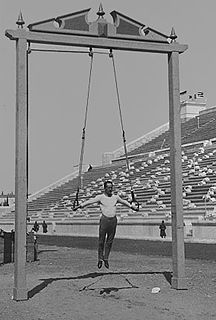
The rings is an artistic gymnastics event held at the Summer Olympics. The event was first held for men at the first modern Olympics in 1896. It was held again in 1904, but not in 1900, 1908, 1912, or 1920 when no apparatus events were awarded medals. The rings was one of the components of the men's artistic individual all-around in 1900, 1908, and 1912, however. The men's rings returned as a medal event in 1924 and has been held every Games since. Rings scores were included in the individual all-around for 1924 and 1928, with no separate apparatus final. In 1932, the rings was entirely separate from the all-around. From 1936 to 1956, there were again no separate apparatus finals with the rings scores used in the all-around. Beginning in 1960, there were separate apparatus finals.
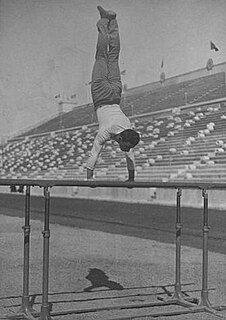
The parallel bars is an artistic gymnastics event held at the Summer Olympics. The event was first held for men at the first modern Olympics in 1896. It was held again in 1904, but not in 1900, 1908, 1912, or 1920 when no apparatus events were awarded medals. The parallel bars was one of the components of the men's artistic individual all-around in 1900, 1908, and 1912, however. The men's parallel bars returned as a medal event in 1924 and has been held every Games since. Parallel bars scores were included in the individual all-around for 1924 and 1928, with no separate apparatus final. In 1932, the parallel bars was entirely separate from the all-around. From 1936 to 1956, there were again no separate apparatus finals with the parallel bars scores used in the all-around. Beginning in 1960, there were separate apparatus finals.
























